八年级上英语|Unit 1 How often do you exercise?|学案
文档属性
| 名称 | 八年级上英语|Unit 1 How often do you exercise?|学案 |
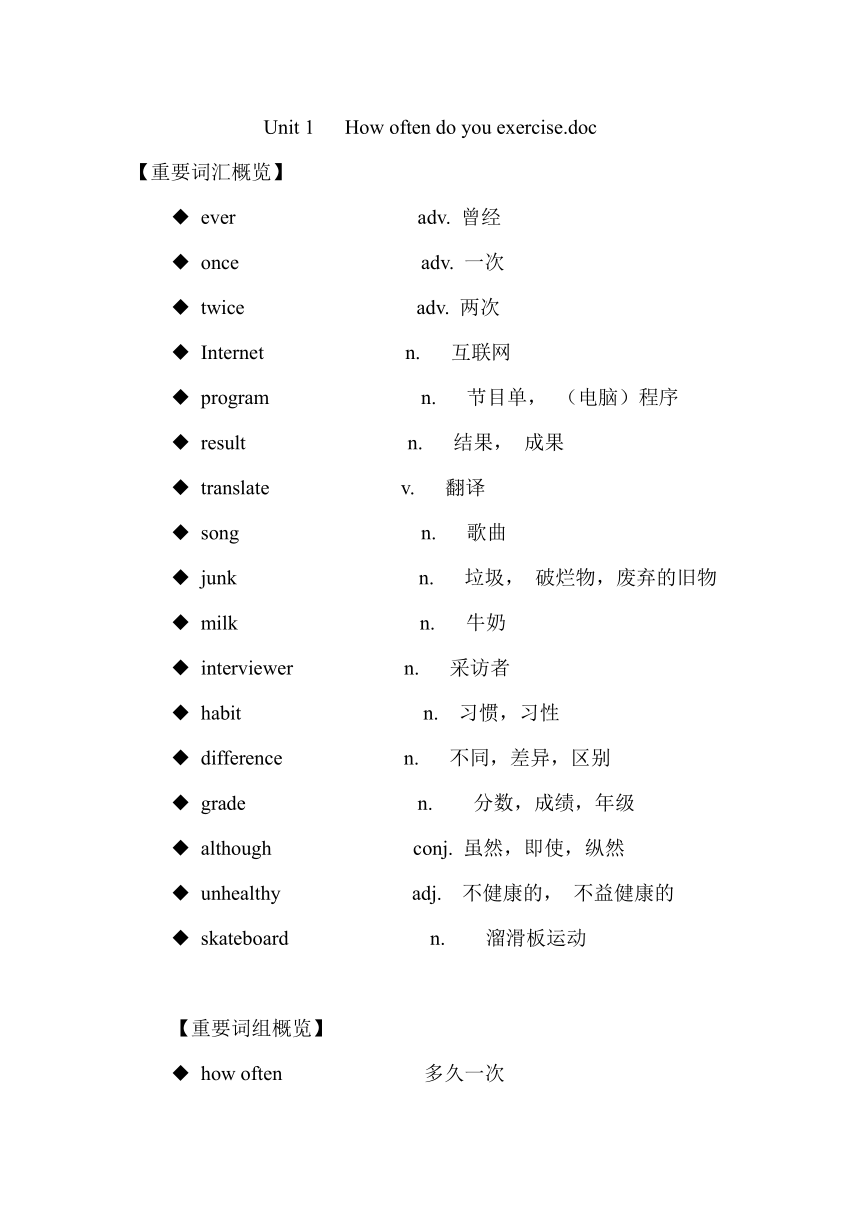
|
|
| 格式 | rar | ||
| 文件大小 | 18.5KB | ||
| 资源类型 | 教案 | ||
| 版本资源 | 人教新目标(Go for it)版 | ||
| 科目 | 英语 | ||
| 更新时间 | 2009-11-18 00:00:00 | ||
图片预览

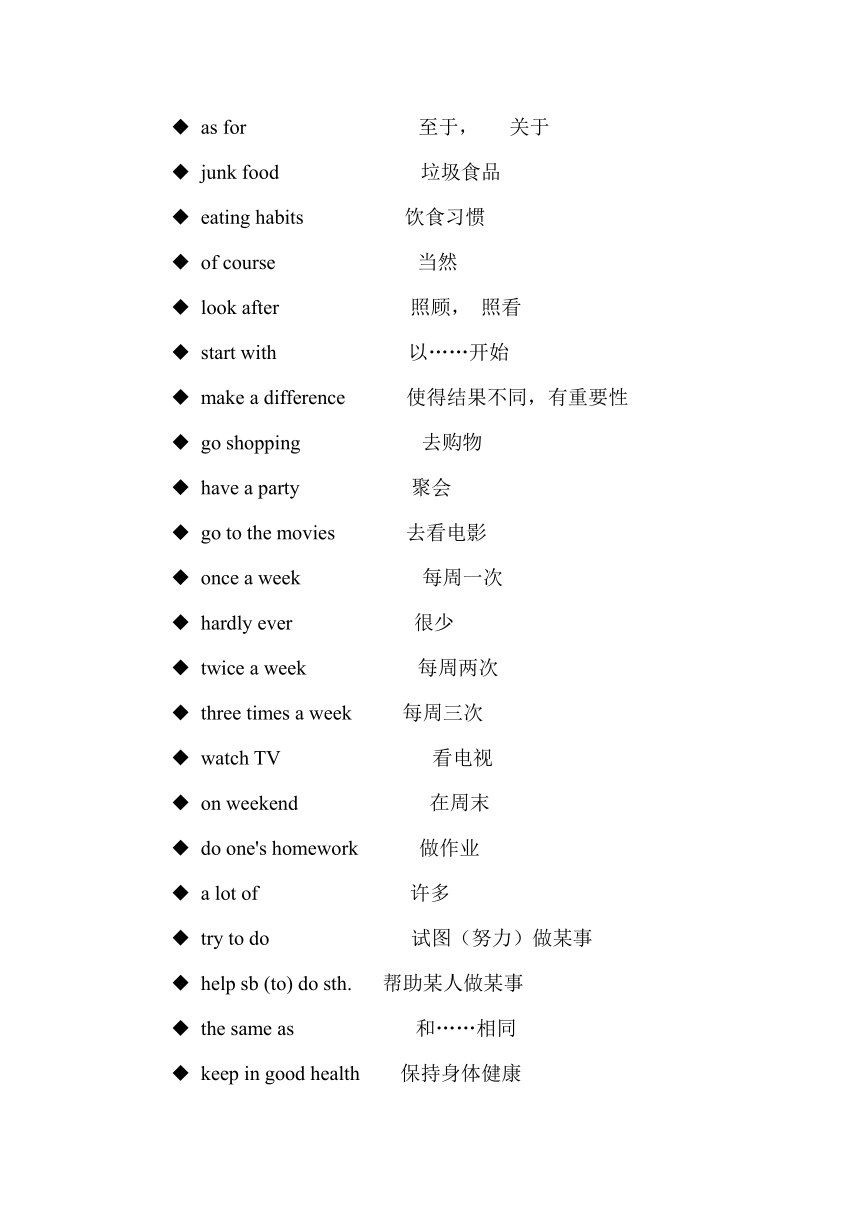
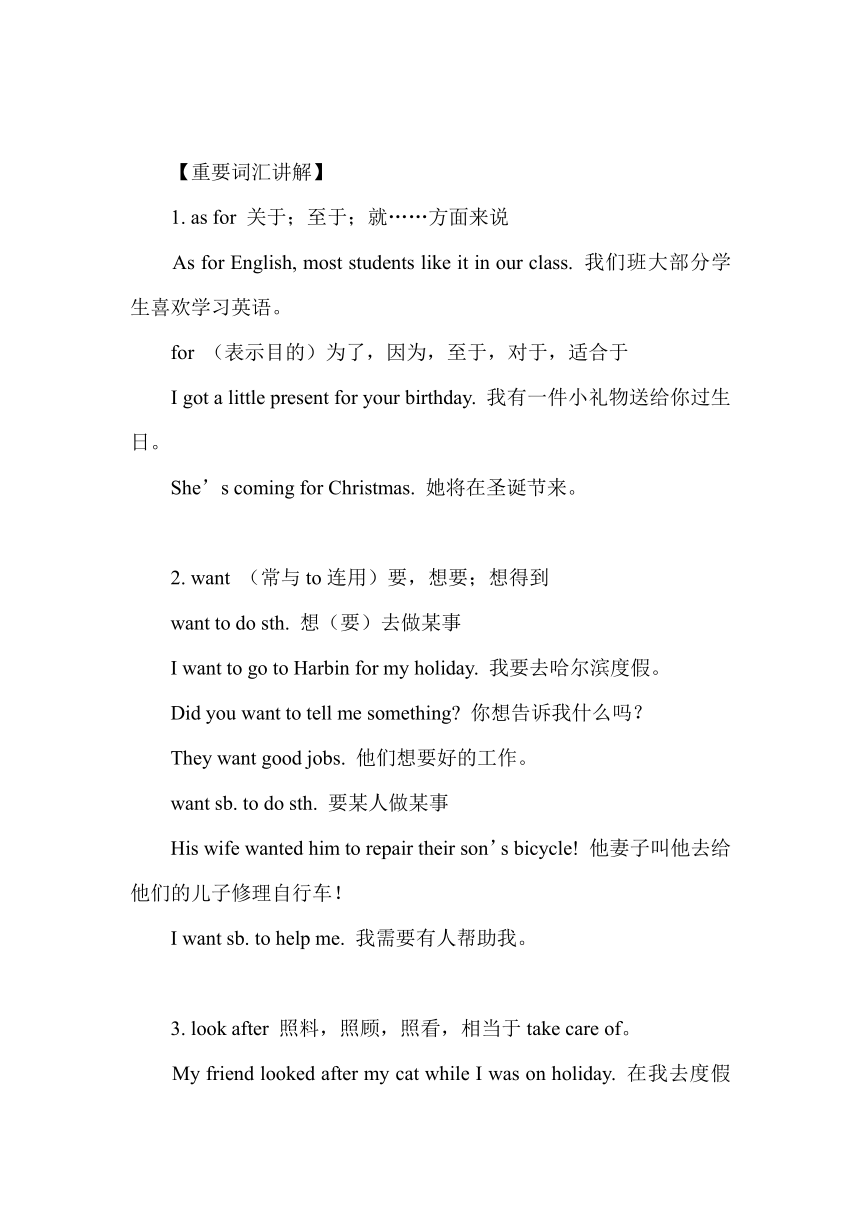
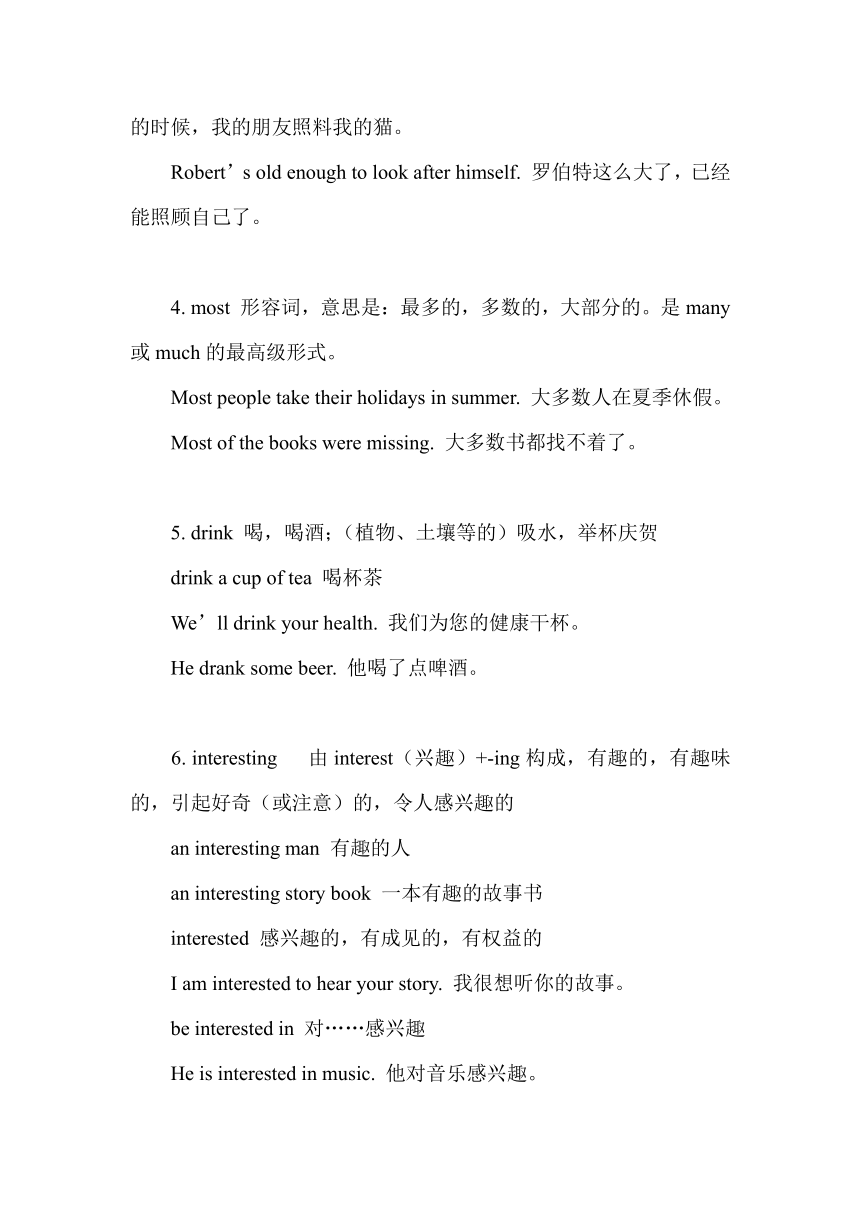
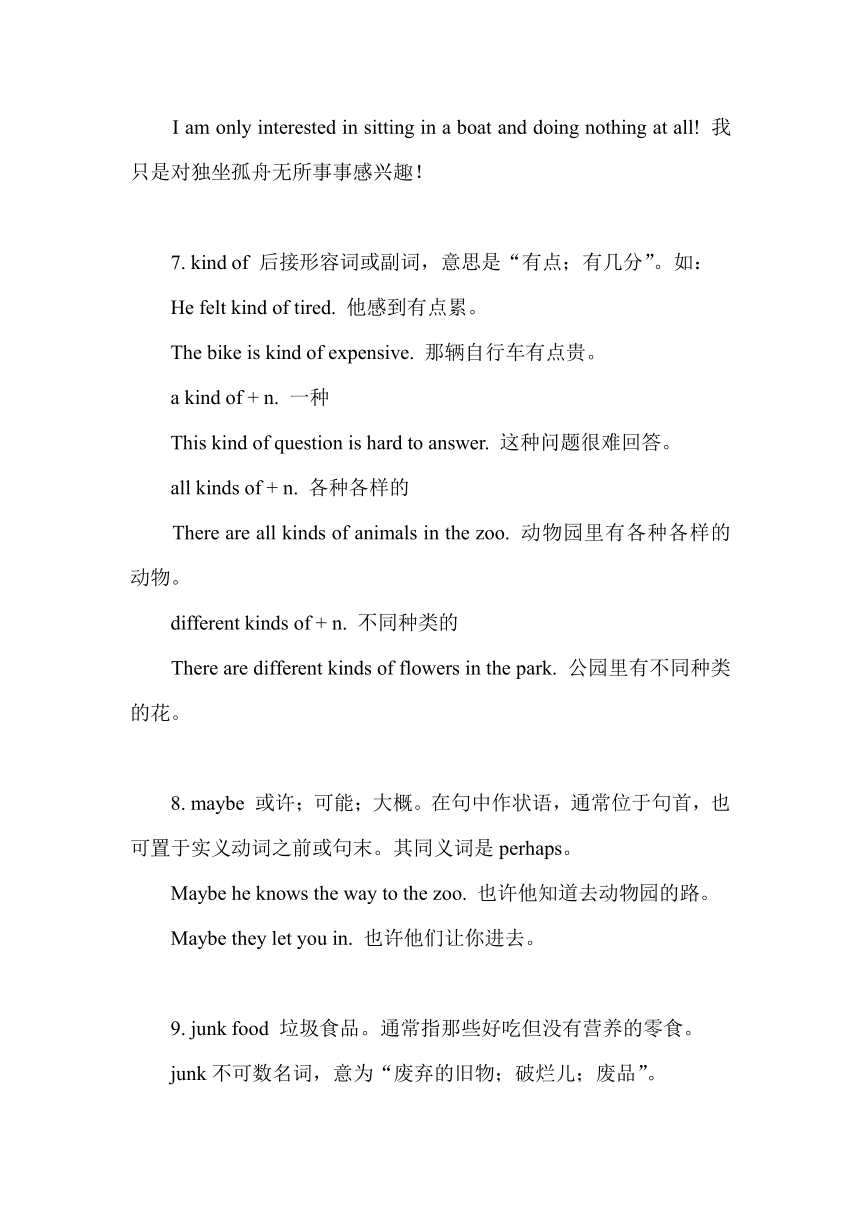
文档简介
Unit 1 How often do you exercise.doc
【重要词汇概览】
◆ ever adv. 曾经
◆ once adv. 一次
◆ twice adv. 两次
◆ Internet n. 互联网
◆ program n. 节目单, (电脑)程序
◆ result n. 结果, 成果
◆ translate v. 翻译
◆ song n. 歌曲
◆ junk n. 垃圾, 破烂物,废弃的旧物
◆ milk n. 牛奶
◆ interviewer n. 采访者
◆ habit n. 习惯,习性
◆ difference n. 不同,差异,区别
◆ grade n. 分数,成绩,年级
◆ although conj. 虽然,即使,纵然
◆ unhealthy adj. 不健康的, 不益健康的
◆ skateboard n. 溜滑板运动
【重要词组概览】
◆ how often 多久一次
◆ as for 至于, 关于
◆ junk food 垃圾食品
◆ eating habits 饮食习惯
◆ of course 当然
◆ look after 照顾, 照看
◆ start with 以……开始
◆ make a difference 使得结果不同,有重要性
◆ go shopping 去购物
◆ have a party 聚会
◆ go to the movies 去看电影
◆ once a week 每周一次
◆ hardly ever 很少
◆ twice a week 每周两次
◆ three times a week 每周三次
◆ watch TV 看电视
◆ on weekend 在周末
◆ do one's homework 做作业
◆ a lot of 许多
◆ try to do 试图(努力)做某事
◆ help sb (to) do sth. 帮助某人做某事
◆ the same as 和……相同
◆ keep in good health 保持身体健康
【重要词汇讲解】
1. as for 关于;至于;就……方面来说
As for English, most students like it in our class. 我们班大部分学生喜欢学习英语。
for (表示目的)为了,因为,至于,对于,适合于
I got a little present for your birthday. 我有一件小礼物送给你过生日。
She’s coming for Christmas. 她将在圣诞节来。
2. want (常与to连用)要,想要;想得到
want to do sth. 想(要)去做某事
I want to go to Harbin for my holiday. 我要去哈尔滨度假。
Did you want to tell me something 你想告诉我什么吗?
They want good jobs. 他们想要好的工作。
want sb. to do sth. 要某人做某事
His wife wanted him to repair their son’s bicycle! 他妻子叫他去给他们的儿子修理自行车!
I want sb. to help me. 我需要有人帮助我。
3. look after 照料,照顾,照看,相当于take care of。
My friend looked after my cat while I was on holiday. 在我去度假的时候,我的朋友照料我的猫。
Robert’s old enough to look after himself. 罗伯特这么大了,已经能照顾自己了。
4. most 形容词,意思是:最多的,多数的,大部分的。是many或much的最高级形式。
Most people take their holidays in summer. 大多数人在夏季休假。
Most of the books were missing. 大多数书都找不着了。
5. drink 喝,喝酒;(植物、土壤等的)吸水,举杯庆贺
drink a cup of tea 喝杯茶
We’ll drink your health. 我们为您的健康干杯。
He drank some beer. 他喝了点啤酒。
6. interesting 由interest(兴趣)+-ing构成,有趣的,有趣味的,引起好奇(或注意)的,令人感兴趣的
an interesting man 有趣的人
an interesting story book 一本有趣的故事书
interested 感兴趣的,有成见的,有权益的
I am interested to hear your story. 我很想听你的故事。
be interested in 对……感兴趣
He is interested in music. 他对音乐感兴趣。
I am only interested in sitting in a boat and doing nothing at all! 我只是对独坐孤舟无所事事感兴趣!
7. kind of 后接形容词或副词,意思是“有点;有几分”。如:
He felt kind of tired. 他感到有点累。
The bike is kind of expensive. 那辆自行车有点贵。
a kind of + n. 一种
This kind of question is hard to answer. 这种问题很难回答。
all kinds of + n. 各种各样的
There are all kinds of animals in the zoo. 动物园里有各种各样的动物。
different kinds of + n. 不同种类的
There are different kinds of flowers in the park. 公园里有不同种类的花。
8. maybe 或许;可能;大概。在句中作状语,通常位于句首,也可置于实义动词之前或句末。其同义词是perhaps。
Maybe he knows the way to the zoo. 也许他知道去动物园的路。
Maybe they let you in. 也许他们让你进去。
9. junk food 垃圾食品。通常指那些好吃但没有营养的零食。
junk不可数名词,意为“废弃的旧物;破烂儿;废品”。
a junk market 旧货市场
a junk dealer 收破烂的人
10. make a difference表示“使得结果不同,有重要性”是一动词短语。
If you do so,it will make a great difference. 如果你那样做,影响就很大了。
A year or two will make a great difference to us. 对我们来说一年还是两年有很大的区别。
11. help后的动词不定式可以带to,也可以不带to。表示“帮助某人做某事”,不过当help之后接一个较长的名词性词组作宾语或当其中的不定式所表示的动作主语不直接参与时,不定式一般要带to。如:
I often help mum do housework after school. 放学后我经常帮妈妈干家务活。
I helped him (to) repair his bike. 我帮他修自行车。
Help the little boys at the back of the hall to carry the chairs out. 请帮大厅后面那些小男孩把椅子搬出去。
These tablets will help you to sleep. 这些药片将对你的睡眠有帮助。
【重难点分析】
1. … but I'm pretty healthy.但是我相当健康。
1) 句中pretty是副词意为“相当,颇,很”,作状语修饰healthy。例如:
I feel pretty tired.我感到相当疲倦了。
Her sister is still pretty sick.她妹妹病情还相当重。
The wind blew pretty hard.风刮得很厉害。
2) health健康。其形容词形式是healthy。
Exercising more is good for our health. 多锻炼对我们的身体有益。
keep healthy 保持身体健康 be in good health 健康
We are all in good health. 我们身体都很健康。
2. I try to eat a lot of vegetables, usually ten to eleven times a week. 我努力吃大量蔬菜,通常每周十至十一次。
1) try作及物动词:试;努力,接不定式try to do sth. 表示“试图做某事;想要做某事”;接动名词表示“做某事试试看”。
Try how far you can throw. 试试看你能扔多远。
I'll try to come tomorrow. 我明天争取来。
He tried not to smile. 他设法不笑。
Have you tried eating fish with jam 你试没试过吃鱼加果酱
Try writing out the new program. 编一个新程序试试。
词组:try on 试穿
try one’s best 竭尽所能
have a try 试一试
2)a lot of (=lots of) 大量,许多;既能修饰可数名词,又能修饰不可数名词。a lot of一般用于口语肯定句中,在否定句和疑问句中则用many或much。例如:
I picked lots of flowers. 我摘了许多花。
Thanks a lot. 多谢。
A lot of energy was wasted. 大量的能源被浪费掉了。
There isn't much tea in the cup. 杯子里茶水不多了。
Do you have many questions to ask 你有许多问题要问吗
3)ten to eleven times a week是名词性短语起副词的作用,在句中作时间状语。表示次数一次用once,二次用twice,三次以上用“数词+times”。在表示时间频度的有关短语中一般均用a代替every,这时a表示“每一”,相当于介词per的含义。例如:
We have three meals a day.我们一日三餐。
They have five English classes a week.他们每周上五节英语课。
They meet once a month.他们每月会面一次。
3. So maybe I'm not very healthy,although I do have one healthy habit.因此,或许我不是很健康,但我的确有一健康的习惯。
1)这是一个含有让步状语从句的主从复合句,although表示“虽然”、“但是”引导让步状语从句通常置于句子后部,也可置于句子前部。需要注意的是,从句中用了though或although,主句中就不能再用but,这和汉语翻译“虽然……但是……”不一样。例如:
He went out,though it was raining. 尽管下雨他还是出去了。
Although they started early,they arrived late. 虽然他们动身很早,但是到的却很晚。
2)句中强调词do用来加强从句中谓语动词的语气,这种用法通常用于符合以下两个条件的句子中;①句子是肯定句;②句子中的谓语动词是一般现在时或一般过去时,分别用do,does或did来加强其语气。do的强调用法在译成汉语时,可依照各种情况译成“是……”、“的确”、“确实”等。例如:
Do tell me all about it. 请告诉我一切吧。
You do look nice today. 你今天看上去真漂亮。
She said she would come and did come. 她说她要来,她果真来了。
4. Fill in the blanks with the words given. 用所给单词填空。
这是一个祈使句,fill in表示“填写”、“填上”是固定的动词短语。例如:
Please fill in this form.请填这张表。
Please fill your name and telephone number in the blank。
请把你的名字和电话号码填在空格处。
given是过去分词作后置定语,修饰words。words与give之间是被动关系,所以应用过去分词作定语。例如:
This is a book written by a peasant.这是一本农民写的书。
【词语辨析】
1. good, fine, well与nice这几个形容词都有“好”的意思。
(1)good是通用词,可以表示各种品质方面的优异,从美学到道德规范几乎都可以使用。
It’s an old film, but it’s very good. 那是一部老电影,但是很好。
(2)fine表示“上好的,精细的”,也可以表示“美好的”,天气“晴朗的”。
She always wears fine clothes. 她总穿好衣服。
It is fine sand. 这是细沙。
It is a fine day today. 今天天气晴朗。
(3)well表示身体“无病的,健康的”。
You look very well, Jimmy. 你看上去很好,吉米。
He’s better, thank you, doctor. 他好些了,谢谢你,医生。
(4)nice表示使人感到“愉快的,好的”。这几个词虽然都有“好”的意思,但是只是近义词,而且初学者不易掌握。
These ice-creams are nice. 这些冰淇淋真好。
He’s a very nice man. We shall miss him. 他是个很好的人。我们会想念他的。
She is a very nice girl. 她是个很好的姑娘。
注意:
nice and = very, rather
It’s nice and warm in here. 这里面很暖和。
2. home, house和family三者都可表示“家”,但所指不同。
(1)house一般指所居住的建筑物,即“房子;住宅。”
His house was burned in a big fire. 他的家在一场大火中被烧了。
(2)family着重指家庭的成员。如:
My family are all fond of music. 我们一家人都喜欢音乐。
(3)而home则指某人出生及生活的那个环境,包括住处及家人。如:
He left home at the age of 18. 他十八岁离开了家。
homework 家庭作业;课外作业
He usually does his homework after school. 他通常放学后做作业。
hometown 家乡;故乡
—Where’s your hometown 你的家乡在哪里?
—It’s in Suzhou. 在苏州。
homeland 祖国;本国
I love my homeland—China. 我爱我的祖国——中国。
3. maybe, perhaps, likely, possibly与probably
perhaps也许,是也许如此也许不如此的意思,大体和possibly同义
probably大概;肯定的成分较大,是most likely的意思
possibly或者,常和can, may, must等情态动词连用,比probably语气弱得多
maybe或许,比perhaps普通但不庄重;likely或许,通常与most, very连用。如:
Most likely she is over thirty. 她也许已经30多岁了。
4. maybe与may be
maybe连在一起是副词,意为“可能;也许;大概”,在句中作状语,通常置于句首,也可以放在谓语动词之前。may be分写是“情态动词+动词原形”的形式,意为“可能是;也许是”,在句中作谓语。试比较:
Maybe he will come, maybe he won’t. 他也许来,也许不来。
—Is that true 那是真的吗?
—Maybe, I’m not sure. 也许(可能)是,我说不准。
He may be eighteen. 他可能18岁了。
Maybe your book is at home. 也许你的书在家里。
The book may be in the desk. 那本书可能在课桌里。
5. although与though
although和though作连词用,意为“尽管;虽然”,二者可以通用。如:
Although / Though they are so poor, they have enough to eat.
他们虽然很穷,食物还是够吃的。
在一个句子里,用了although或though,就不能用but,用了but,则不能使用although或though,即“虽然……但是……”不见面,但可用yet。如:
Although (Thought) it was very cold, (yet) he went out without an overcoat. = It was very cold, but he went out without an overcoat.
尽管外面很冷,但他没有穿大衣就出去了。
【语法知识聚焦】
一般现在时 The Simple Present Tense
一般现在时表示现在的状态
He is twelve. 他十二岁。
They are at home. 他们在家。
表示经常性或习惯性的动作
I go to school at seven every day.
He plays soccer on Sundays.
表示主语具备的性格和能力等
She likes apples.
They speak Japanese.
She is of medium build.
肯定式
I am a cleaner.
You are right.
He / She / It is here.
We / You / They are outgoing
否定式
I am not a…
You are not…
He / She / It is not…
We / You / They are not…
否定式和疑问式
We go to school at seven every day.
We don’t go to school at seven.
Do you go to school at seven
Yes, we do.(No, we don’t.)
否定式和疑问式
He goes to school at seven every day.
He doesn’t go to school at seven.
Does he go to school at seven
Yes, he does.(No, he doesn’t.)
一般现在时常和表示时间频度的副词连用。
如:
often, usually, sometimes, always, never, hardly ever等。
1. I often read books in the evening
2. Do they usually go to school by bike
3. He doesn’t like milk. He never drinks it.
4. Sometimes my mother gets back at five.
一般现在时常和以下时间表达法连用。
如:
in the morning, in the afternoon, in the evening, at noon, at night,every day,on Sunday(s), at seven 等。
Do they have math in the morning
She sleeps nine hours every night.
It takes me two hours to do my homework every day.
They don’t have classes on Sundays.
动词第三人称单数的构成:
1、直接加--s
look—looks read—reads
play—plays stop—stops
2. 在字母s, x,ch,sh,o后加--es
miss—misses fix—fixes
watch—watches wash—washes
go—goes do--does
3. 辅音字母加y结尾的动词去y为i,再加--es
carry – carries study – studies
hurry – hurries cry – cries
4.特殊的
have -- has
【语法练习】
选择填空
( ) 1.
A: How often ______ she exercise
B: Twice a week.
A. do B. does C. doing D. did
( ) 2. I ______ like to drink milk.
A.not B. doesn’t C. don’t D. no
( ) 3. Good food and exercise ______ me to study better.
A. help B. helps C. helping D. to help
( ) 4. Is her lifestyle the same ______ yours or different
A. as B. in C. at D. to
( ) 5. I like ____ for breakfast.
A. a book B. a ruler C. an egg D. a sofa
( ) 6. The ____are $21.
A. glasses B. shoe C. table D. bike
( ) 7. Tennis ____ my favourite sport.
A. are B. is C. am D. be
( ) 8. I have a tennis racket and my friend Jim ____ two tennis rackets.
A. have B. play C. plays D. has
( ) 9. “Let’s play computer games.”“That ____ interesting.”
A. looks B. sounds C. listens D. reads
( )10. My father likes football. But he ____ it.
He only ____ football matches on TV!
A. plays, watches B. play, watch
C. doesn’t play, watches D. plays, doesn’t watch
【参考答案与解题思路】
【参考答案】
1. B 2. C 3. A 4. A 5. C 6. A 7. B 8. D 9. B 10. C
【解题思路】
1. 本题考查助动词do和does 的用法。在疑问句或否定句中,当主语为第三人称单数时,助动词用does, 因此,答案为B.
2.本题考查助动词do和does 的用法。因为 I 不是第三人称单数形式,因此,答案为C.
3.此题为判断和理解型试题, Good food and exercise 是两项事物,因此主语不是第三人称单数形式,因此,答案为 A.
4.本题考查固定短语 the same as 的用法,答案为A.
5.本题考查辨认食品类单词, 只有egg是食品, 故答案为C.
6.本题考查动词be的用法, 但考察方法与前面第3小题不同.根据题中的are来判定应该用名词复数.故答案为A.
7.本题考查动词be的用法, 虽然tennis是以-s结尾,但是,它是单数名词,因此,答案为B.
8. 本题考查动词have, has的用法, 由于Jim 是第三人称单数,所以,答案为D.
9.本题考查交际用语 “That sounds interesting.”的使用,因此,答案为B.
10.本题考查一般现在时的用法,首先根据题中My father likes football.和But的提示, 判定第一个空应选择doesn’t play,又根据on TV而得到答案watches, 故答案为C.
【综合能力检测】
一.根据题意和所给的字母提示,填入正确的单词。
1. Hamburger is a kind of j__ __ __ food. I hardly ever eat hamburgers.
2. I surf the In__ __ __ __ __ __ every day.
3. Look! The old people are on the hill__ __ __. They climb the hills once a week.
4. Tom studies English best in our class. He has a big v__ c__b__l__r__.
5. My grandparents exercise twice a week to st__ __ healthy.
6. Some students watch TV three or four t__ __ __ __ a week.
7. Does it m__ __ __ a big difference if you eat fruit every day
8. It's very important to have a good eating h__ __ __ __.
9. I never go shopping. I can't st__ __ __ shopping.
10. She often g__ __ __ to the movies on weekends.
二.连词成句
1. what, usually, you do, on, do, weekends
________________________________________
2. how often, your brother, does, take, a, shower
_________________________________________
3. I, nine , hours, sleep, every , night.
_____________________________________.
4. Betty, milk, drinks, every, morning.
____________________________________.
5. some, students, once, watch, TV, or, twice, a, week.
_______________________________________________.
三.方框选词
hardly, cleaning, take, gave, try, to play, visiting, exercises, went , goes
1. I _______ a shower every night.
2. My father ________ ever watches TV in the evening.
3. Thanks for ________ me.
4. Mary often _________ to the movies on weekends.
5. Grandma is pretty healthy because she ___________ every day.
6. You must ________ to eat less meat.
7. I like __________ basketball.
8. What did you do in summer holidays
I ________ to Hongkong with my parents.
9. My mother _______ me a new bike on my birthday .
10.What are you doing We are __________ our room.
四. 根据括号中所给提示词语,回答问题。
1. What do you usually do on weekends ( climb the hill)
_____________________________________________.
2. How often do you go to the movies ( once a year)
______________________________________________
3. How often does your brother play soccer ( three or four times a week)
____________________________________________________
4. What does your mother do at home ( watch TV)
____________________________________________
5. Are you healthy (yes)
____________________________________________
五.写作
根据表格内容写一篇50字的短文。
Name exercise vegetables fruit milk junk food sleep
Peter every day 7 times a week every day every day once a week nine
hours
John hardly sometimes never never 3 and 4 times a week nine
hours
Peter is pretty healthy. He exercises every day.______________________________________
______________________________________________________________________________________
______________________________________________________________________________________
John is unhealthy . He hardly ever exercises._________________________________________
______________________________________________________________________________________
______________________________________________________________________________________
【答案与解析】
一.根据题意和所给的字母提示,填入正确的单词。
1. junk 2. Internet 3. hilltop 4. vocabulary 5. stay
6. times 7. make 8. habit 9. stand 10. goes
二.连词成句
1. What do you usually do on weekends
2. How often does your brother take a shower
3. I sleep nine hours every night.
4. Betty drinks milk every morning.
5. Some students watch TV once or twice a week.
三.方框选词
1. take 2. hardly 3. visiting 4. goes 5. exercises
6. try 7. to play 8. went 9. gave 10. cleaning
解析:
1. 本题考查动词短语take a shower 的用法, 由于时间状语为every night,应该用一般现在时。又语为I , 因此答案为take.
2. 本题考查短语hardly ever 的用法, 因此答案为 hardly.
3.for 为介词, 介词的后面应该用动名词, 因此答案为visiting.
4. 本题考查短语go to the movies 的用法。时间状语为often,应该用一般现在时。主语为第三人称单数,故答案为goes.
5. 根据所给词语和题意理解为:grandma 身体健康的原因是每天锻炼身体,因此,本题答案为: exercises.
6. must是情态动词,其后应该接动词原形,根据题意,本题答案为try.
7. 动词like 可以构成:like doing sth. 和like to do sth. 意思为:喜欢做某事。本题根据题意和所给词汇,答案应为to play.
8. 根据题意判断,本题为一般过去时态。故答案为went.
9. 根据题意判断,本题为一般过去时态。考虑所给的词汇,本题答案为:gave.
10. 因为本题为现在进行时态,又题中横线的前面已经有are, 本题答案为cleaning.
四. 根据括号中所给提示词语,回答问题。
1. I usually climb the hill on weekends.
2. I go to the movies once a year.
3. My brother plays soccer three or four times a week.
4. She watches TV at home.
5. Yes, I am.
解析:
3. 主语是My brother,第三人称单数, 因此动词应该用plays.
4. 主语是She, 第三人称单数,因此动词应该用watches.
5. 根据所给词意确定,本题答案应该为一般疑问句的肯定回答,所以答案为, Yes, I am.
五.写作
根据所给条件,写出短文,书写时应该用一般现在时。同时还要注意动词的形式,因为主语都是第三人称单数,所以动词也应该用第三人称单数形式。
【重要词汇概览】
◆ ever adv. 曾经
◆ once adv. 一次
◆ twice adv. 两次
◆ Internet n. 互联网
◆ program n. 节目单, (电脑)程序
◆ result n. 结果, 成果
◆ translate v. 翻译
◆ song n. 歌曲
◆ junk n. 垃圾, 破烂物,废弃的旧物
◆ milk n. 牛奶
◆ interviewer n. 采访者
◆ habit n. 习惯,习性
◆ difference n. 不同,差异,区别
◆ grade n. 分数,成绩,年级
◆ although conj. 虽然,即使,纵然
◆ unhealthy adj. 不健康的, 不益健康的
◆ skateboard n. 溜滑板运动
【重要词组概览】
◆ how often 多久一次
◆ as for 至于, 关于
◆ junk food 垃圾食品
◆ eating habits 饮食习惯
◆ of course 当然
◆ look after 照顾, 照看
◆ start with 以……开始
◆ make a difference 使得结果不同,有重要性
◆ go shopping 去购物
◆ have a party 聚会
◆ go to the movies 去看电影
◆ once a week 每周一次
◆ hardly ever 很少
◆ twice a week 每周两次
◆ three times a week 每周三次
◆ watch TV 看电视
◆ on weekend 在周末
◆ do one's homework 做作业
◆ a lot of 许多
◆ try to do 试图(努力)做某事
◆ help sb (to) do sth. 帮助某人做某事
◆ the same as 和……相同
◆ keep in good health 保持身体健康
【重要词汇讲解】
1. as for 关于;至于;就……方面来说
As for English, most students like it in our class. 我们班大部分学生喜欢学习英语。
for (表示目的)为了,因为,至于,对于,适合于
I got a little present for your birthday. 我有一件小礼物送给你过生日。
She’s coming for Christmas. 她将在圣诞节来。
2. want (常与to连用)要,想要;想得到
want to do sth. 想(要)去做某事
I want to go to Harbin for my holiday. 我要去哈尔滨度假。
Did you want to tell me something 你想告诉我什么吗?
They want good jobs. 他们想要好的工作。
want sb. to do sth. 要某人做某事
His wife wanted him to repair their son’s bicycle! 他妻子叫他去给他们的儿子修理自行车!
I want sb. to help me. 我需要有人帮助我。
3. look after 照料,照顾,照看,相当于take care of。
My friend looked after my cat while I was on holiday. 在我去度假的时候,我的朋友照料我的猫。
Robert’s old enough to look after himself. 罗伯特这么大了,已经能照顾自己了。
4. most 形容词,意思是:最多的,多数的,大部分的。是many或much的最高级形式。
Most people take their holidays in summer. 大多数人在夏季休假。
Most of the books were missing. 大多数书都找不着了。
5. drink 喝,喝酒;(植物、土壤等的)吸水,举杯庆贺
drink a cup of tea 喝杯茶
We’ll drink your health. 我们为您的健康干杯。
He drank some beer. 他喝了点啤酒。
6. interesting 由interest(兴趣)+-ing构成,有趣的,有趣味的,引起好奇(或注意)的,令人感兴趣的
an interesting man 有趣的人
an interesting story book 一本有趣的故事书
interested 感兴趣的,有成见的,有权益的
I am interested to hear your story. 我很想听你的故事。
be interested in 对……感兴趣
He is interested in music. 他对音乐感兴趣。
I am only interested in sitting in a boat and doing nothing at all! 我只是对独坐孤舟无所事事感兴趣!
7. kind of 后接形容词或副词,意思是“有点;有几分”。如:
He felt kind of tired. 他感到有点累。
The bike is kind of expensive. 那辆自行车有点贵。
a kind of + n. 一种
This kind of question is hard to answer. 这种问题很难回答。
all kinds of + n. 各种各样的
There are all kinds of animals in the zoo. 动物园里有各种各样的动物。
different kinds of + n. 不同种类的
There are different kinds of flowers in the park. 公园里有不同种类的花。
8. maybe 或许;可能;大概。在句中作状语,通常位于句首,也可置于实义动词之前或句末。其同义词是perhaps。
Maybe he knows the way to the zoo. 也许他知道去动物园的路。
Maybe they let you in. 也许他们让你进去。
9. junk food 垃圾食品。通常指那些好吃但没有营养的零食。
junk不可数名词,意为“废弃的旧物;破烂儿;废品”。
a junk market 旧货市场
a junk dealer 收破烂的人
10. make a difference表示“使得结果不同,有重要性”是一动词短语。
If you do so,it will make a great difference. 如果你那样做,影响就很大了。
A year or two will make a great difference to us. 对我们来说一年还是两年有很大的区别。
11. help后的动词不定式可以带to,也可以不带to。表示“帮助某人做某事”,不过当help之后接一个较长的名词性词组作宾语或当其中的不定式所表示的动作主语不直接参与时,不定式一般要带to。如:
I often help mum do housework after school. 放学后我经常帮妈妈干家务活。
I helped him (to) repair his bike. 我帮他修自行车。
Help the little boys at the back of the hall to carry the chairs out. 请帮大厅后面那些小男孩把椅子搬出去。
These tablets will help you to sleep. 这些药片将对你的睡眠有帮助。
【重难点分析】
1. … but I'm pretty healthy.但是我相当健康。
1) 句中pretty是副词意为“相当,颇,很”,作状语修饰healthy。例如:
I feel pretty tired.我感到相当疲倦了。
Her sister is still pretty sick.她妹妹病情还相当重。
The wind blew pretty hard.风刮得很厉害。
2) health健康。其形容词形式是healthy。
Exercising more is good for our health. 多锻炼对我们的身体有益。
keep healthy 保持身体健康 be in good health 健康
We are all in good health. 我们身体都很健康。
2. I try to eat a lot of vegetables, usually ten to eleven times a week. 我努力吃大量蔬菜,通常每周十至十一次。
1) try作及物动词:试;努力,接不定式try to do sth. 表示“试图做某事;想要做某事”;接动名词表示“做某事试试看”。
Try how far you can throw. 试试看你能扔多远。
I'll try to come tomorrow. 我明天争取来。
He tried not to smile. 他设法不笑。
Have you tried eating fish with jam 你试没试过吃鱼加果酱
Try writing out the new program. 编一个新程序试试。
词组:try on 试穿
try one’s best 竭尽所能
have a try 试一试
2)a lot of (=lots of) 大量,许多;既能修饰可数名词,又能修饰不可数名词。a lot of一般用于口语肯定句中,在否定句和疑问句中则用many或much。例如:
I picked lots of flowers. 我摘了许多花。
Thanks a lot. 多谢。
A lot of energy was wasted. 大量的能源被浪费掉了。
There isn't much tea in the cup. 杯子里茶水不多了。
Do you have many questions to ask 你有许多问题要问吗
3)ten to eleven times a week是名词性短语起副词的作用,在句中作时间状语。表示次数一次用once,二次用twice,三次以上用“数词+times”。在表示时间频度的有关短语中一般均用a代替every,这时a表示“每一”,相当于介词per的含义。例如:
We have three meals a day.我们一日三餐。
They have five English classes a week.他们每周上五节英语课。
They meet once a month.他们每月会面一次。
3. So maybe I'm not very healthy,although I do have one healthy habit.因此,或许我不是很健康,但我的确有一健康的习惯。
1)这是一个含有让步状语从句的主从复合句,although表示“虽然”、“但是”引导让步状语从句通常置于句子后部,也可置于句子前部。需要注意的是,从句中用了though或although,主句中就不能再用but,这和汉语翻译“虽然……但是……”不一样。例如:
He went out,though it was raining. 尽管下雨他还是出去了。
Although they started early,they arrived late. 虽然他们动身很早,但是到的却很晚。
2)句中强调词do用来加强从句中谓语动词的语气,这种用法通常用于符合以下两个条件的句子中;①句子是肯定句;②句子中的谓语动词是一般现在时或一般过去时,分别用do,does或did来加强其语气。do的强调用法在译成汉语时,可依照各种情况译成“是……”、“的确”、“确实”等。例如:
Do tell me all about it. 请告诉我一切吧。
You do look nice today. 你今天看上去真漂亮。
She said she would come and did come. 她说她要来,她果真来了。
4. Fill in the blanks with the words given. 用所给单词填空。
这是一个祈使句,fill in表示“填写”、“填上”是固定的动词短语。例如:
Please fill in this form.请填这张表。
Please fill your name and telephone number in the blank。
请把你的名字和电话号码填在空格处。
given是过去分词作后置定语,修饰words。words与give之间是被动关系,所以应用过去分词作定语。例如:
This is a book written by a peasant.这是一本农民写的书。
【词语辨析】
1. good, fine, well与nice这几个形容词都有“好”的意思。
(1)good是通用词,可以表示各种品质方面的优异,从美学到道德规范几乎都可以使用。
It’s an old film, but it’s very good. 那是一部老电影,但是很好。
(2)fine表示“上好的,精细的”,也可以表示“美好的”,天气“晴朗的”。
She always wears fine clothes. 她总穿好衣服。
It is fine sand. 这是细沙。
It is a fine day today. 今天天气晴朗。
(3)well表示身体“无病的,健康的”。
You look very well, Jimmy. 你看上去很好,吉米。
He’s better, thank you, doctor. 他好些了,谢谢你,医生。
(4)nice表示使人感到“愉快的,好的”。这几个词虽然都有“好”的意思,但是只是近义词,而且初学者不易掌握。
These ice-creams are nice. 这些冰淇淋真好。
He’s a very nice man. We shall miss him. 他是个很好的人。我们会想念他的。
She is a very nice girl. 她是个很好的姑娘。
注意:
nice and = very, rather
It’s nice and warm in here. 这里面很暖和。
2. home, house和family三者都可表示“家”,但所指不同。
(1)house一般指所居住的建筑物,即“房子;住宅。”
His house was burned in a big fire. 他的家在一场大火中被烧了。
(2)family着重指家庭的成员。如:
My family are all fond of music. 我们一家人都喜欢音乐。
(3)而home则指某人出生及生活的那个环境,包括住处及家人。如:
He left home at the age of 18. 他十八岁离开了家。
homework 家庭作业;课外作业
He usually does his homework after school. 他通常放学后做作业。
hometown 家乡;故乡
—Where’s your hometown 你的家乡在哪里?
—It’s in Suzhou. 在苏州。
homeland 祖国;本国
I love my homeland—China. 我爱我的祖国——中国。
3. maybe, perhaps, likely, possibly与probably
perhaps也许,是也许如此也许不如此的意思,大体和possibly同义
probably大概;肯定的成分较大,是most likely的意思
possibly或者,常和can, may, must等情态动词连用,比probably语气弱得多
maybe或许,比perhaps普通但不庄重;likely或许,通常与most, very连用。如:
Most likely she is over thirty. 她也许已经30多岁了。
4. maybe与may be
maybe连在一起是副词,意为“可能;也许;大概”,在句中作状语,通常置于句首,也可以放在谓语动词之前。may be分写是“情态动词+动词原形”的形式,意为“可能是;也许是”,在句中作谓语。试比较:
Maybe he will come, maybe he won’t. 他也许来,也许不来。
—Is that true 那是真的吗?
—Maybe, I’m not sure. 也许(可能)是,我说不准。
He may be eighteen. 他可能18岁了。
Maybe your book is at home. 也许你的书在家里。
The book may be in the desk. 那本书可能在课桌里。
5. although与though
although和though作连词用,意为“尽管;虽然”,二者可以通用。如:
Although / Though they are so poor, they have enough to eat.
他们虽然很穷,食物还是够吃的。
在一个句子里,用了although或though,就不能用but,用了but,则不能使用although或though,即“虽然……但是……”不见面,但可用yet。如:
Although (Thought) it was very cold, (yet) he went out without an overcoat. = It was very cold, but he went out without an overcoat.
尽管外面很冷,但他没有穿大衣就出去了。
【语法知识聚焦】
一般现在时 The Simple Present Tense
一般现在时表示现在的状态
He is twelve. 他十二岁。
They are at home. 他们在家。
表示经常性或习惯性的动作
I go to school at seven every day.
He plays soccer on Sundays.
表示主语具备的性格和能力等
She likes apples.
They speak Japanese.
She is of medium build.
肯定式
I am a cleaner.
You are right.
He / She / It is here.
We / You / They are outgoing
否定式
I am not a…
You are not…
He / She / It is not…
We / You / They are not…
否定式和疑问式
We go to school at seven every day.
We don’t go to school at seven.
Do you go to school at seven
Yes, we do.(No, we don’t.)
否定式和疑问式
He goes to school at seven every day.
He doesn’t go to school at seven.
Does he go to school at seven
Yes, he does.(No, he doesn’t.)
一般现在时常和表示时间频度的副词连用。
如:
often, usually, sometimes, always, never, hardly ever等。
1. I often read books in the evening
2. Do they usually go to school by bike
3. He doesn’t like milk. He never drinks it.
4. Sometimes my mother gets back at five.
一般现在时常和以下时间表达法连用。
如:
in the morning, in the afternoon, in the evening, at noon, at night,every day,on Sunday(s), at seven 等。
Do they have math in the morning
She sleeps nine hours every night.
It takes me two hours to do my homework every day.
They don’t have classes on Sundays.
动词第三人称单数的构成:
1、直接加--s
look—looks read—reads
play—plays stop—stops
2. 在字母s, x,ch,sh,o后加--es
miss—misses fix—fixes
watch—watches wash—washes
go—goes do--does
3. 辅音字母加y结尾的动词去y为i,再加--es
carry – carries study – studies
hurry – hurries cry – cries
4.特殊的
have -- has
【语法练习】
选择填空
( ) 1.
A: How often ______ she exercise
B: Twice a week.
A. do B. does C. doing D. did
( ) 2. I ______ like to drink milk.
A.not B. doesn’t C. don’t D. no
( ) 3. Good food and exercise ______ me to study better.
A. help B. helps C. helping D. to help
( ) 4. Is her lifestyle the same ______ yours or different
A. as B. in C. at D. to
( ) 5. I like ____ for breakfast.
A. a book B. a ruler C. an egg D. a sofa
( ) 6. The ____are $21.
A. glasses B. shoe C. table D. bike
( ) 7. Tennis ____ my favourite sport.
A. are B. is C. am D. be
( ) 8. I have a tennis racket and my friend Jim ____ two tennis rackets.
A. have B. play C. plays D. has
( ) 9. “Let’s play computer games.”“That ____ interesting.”
A. looks B. sounds C. listens D. reads
( )10. My father likes football. But he ____ it.
He only ____ football matches on TV!
A. plays, watches B. play, watch
C. doesn’t play, watches D. plays, doesn’t watch
【参考答案与解题思路】
【参考答案】
1. B 2. C 3. A 4. A 5. C 6. A 7. B 8. D 9. B 10. C
【解题思路】
1. 本题考查助动词do和does 的用法。在疑问句或否定句中,当主语为第三人称单数时,助动词用does, 因此,答案为B.
2.本题考查助动词do和does 的用法。因为 I 不是第三人称单数形式,因此,答案为C.
3.此题为判断和理解型试题, Good food and exercise 是两项事物,因此主语不是第三人称单数形式,因此,答案为 A.
4.本题考查固定短语 the same as 的用法,答案为A.
5.本题考查辨认食品类单词, 只有egg是食品, 故答案为C.
6.本题考查动词be的用法, 但考察方法与前面第3小题不同.根据题中的are来判定应该用名词复数.故答案为A.
7.本题考查动词be的用法, 虽然tennis是以-s结尾,但是,它是单数名词,因此,答案为B.
8. 本题考查动词have, has的用法, 由于Jim 是第三人称单数,所以,答案为D.
9.本题考查交际用语 “That sounds interesting.”的使用,因此,答案为B.
10.本题考查一般现在时的用法,首先根据题中My father likes football.和But的提示, 判定第一个空应选择doesn’t play,又根据on TV而得到答案watches, 故答案为C.
【综合能力检测】
一.根据题意和所给的字母提示,填入正确的单词。
1. Hamburger is a kind of j__ __ __ food. I hardly ever eat hamburgers.
2. I surf the In__ __ __ __ __ __ every day.
3. Look! The old people are on the hill__ __ __. They climb the hills once a week.
4. Tom studies English best in our class. He has a big v__ c__b__l__r__.
5. My grandparents exercise twice a week to st__ __ healthy.
6. Some students watch TV three or four t__ __ __ __ a week.
7. Does it m__ __ __ a big difference if you eat fruit every day
8. It's very important to have a good eating h__ __ __ __.
9. I never go shopping. I can't st__ __ __ shopping.
10. She often g__ __ __ to the movies on weekends.
二.连词成句
1. what, usually, you do, on, do, weekends
________________________________________
2. how often, your brother, does, take, a, shower
_________________________________________
3. I, nine , hours, sleep, every , night.
_____________________________________.
4. Betty, milk, drinks, every, morning.
____________________________________.
5. some, students, once, watch, TV, or, twice, a, week.
_______________________________________________.
三.方框选词
hardly, cleaning, take, gave, try, to play, visiting, exercises, went , goes
1. I _______ a shower every night.
2. My father ________ ever watches TV in the evening.
3. Thanks for ________ me.
4. Mary often _________ to the movies on weekends.
5. Grandma is pretty healthy because she ___________ every day.
6. You must ________ to eat less meat.
7. I like __________ basketball.
8. What did you do in summer holidays
I ________ to Hongkong with my parents.
9. My mother _______ me a new bike on my birthday .
10.What are you doing We are __________ our room.
四. 根据括号中所给提示词语,回答问题。
1. What do you usually do on weekends ( climb the hill)
_____________________________________________.
2. How often do you go to the movies ( once a year)
______________________________________________
3. How often does your brother play soccer ( three or four times a week)
____________________________________________________
4. What does your mother do at home ( watch TV)
____________________________________________
5. Are you healthy (yes)
____________________________________________
五.写作
根据表格内容写一篇50字的短文。
Name exercise vegetables fruit milk junk food sleep
Peter every day 7 times a week every day every day once a week nine
hours
John hardly sometimes never never 3 and 4 times a week nine
hours
Peter is pretty healthy. He exercises every day.______________________________________
______________________________________________________________________________________
______________________________________________________________________________________
John is unhealthy . He hardly ever exercises._________________________________________
______________________________________________________________________________________
______________________________________________________________________________________
【答案与解析】
一.根据题意和所给的字母提示,填入正确的单词。
1. junk 2. Internet 3. hilltop 4. vocabulary 5. stay
6. times 7. make 8. habit 9. stand 10. goes
二.连词成句
1. What do you usually do on weekends
2. How often does your brother take a shower
3. I sleep nine hours every night.
4. Betty drinks milk every morning.
5. Some students watch TV once or twice a week.
三.方框选词
1. take 2. hardly 3. visiting 4. goes 5. exercises
6. try 7. to play 8. went 9. gave 10. cleaning
解析:
1. 本题考查动词短语take a shower 的用法, 由于时间状语为every night,应该用一般现在时。又语为I , 因此答案为take.
2. 本题考查短语hardly ever 的用法, 因此答案为 hardly.
3.for 为介词, 介词的后面应该用动名词, 因此答案为visiting.
4. 本题考查短语go to the movies 的用法。时间状语为often,应该用一般现在时。主语为第三人称单数,故答案为goes.
5. 根据所给词语和题意理解为:grandma 身体健康的原因是每天锻炼身体,因此,本题答案为: exercises.
6. must是情态动词,其后应该接动词原形,根据题意,本题答案为try.
7. 动词like 可以构成:like doing sth. 和like to do sth. 意思为:喜欢做某事。本题根据题意和所给词汇,答案应为to play.
8. 根据题意判断,本题为一般过去时态。故答案为went.
9. 根据题意判断,本题为一般过去时态。考虑所给的词汇,本题答案为:gave.
10. 因为本题为现在进行时态,又题中横线的前面已经有are, 本题答案为cleaning.
四. 根据括号中所给提示词语,回答问题。
1. I usually climb the hill on weekends.
2. I go to the movies once a year.
3. My brother plays soccer three or four times a week.
4. She watches TV at home.
5. Yes, I am.
解析:
3. 主语是My brother,第三人称单数, 因此动词应该用plays.
4. 主语是She, 第三人称单数,因此动词应该用watches.
5. 根据所给词意确定,本题答案应该为一般疑问句的肯定回答,所以答案为, Yes, I am.
五.写作
根据所给条件,写出短文,书写时应该用一般现在时。同时还要注意动词的形式,因为主语都是第三人称单数,所以动词也应该用第三人称单数形式。
同课章节目录
- Unit 1 Where did you go on vacation?
- Section A
- Section B
- Unit 2 How often do you exercise?
- Section A
- Section B
- Unit 3 I'm more outgoing than my sister.
- Section A
- Section B
- Unit 4 What's the best movie theater?
- Section A
- Section B
- Unit 5 Do you want to watch a game show?
- Section A
- Section B
- Unit 6 I'm going to study computer science.
- Section A
- Section B
- Unit 7 Will people have robots?
- Section A
- Section B
- Unit 8 How do you make a banana milk shake?
- Section A
- Section B
- Unit 9 Can you come to my party?
- Section A
- Section B
- Unit 10 If you go to the party, you'll have a grea
- Section A
- Section B
